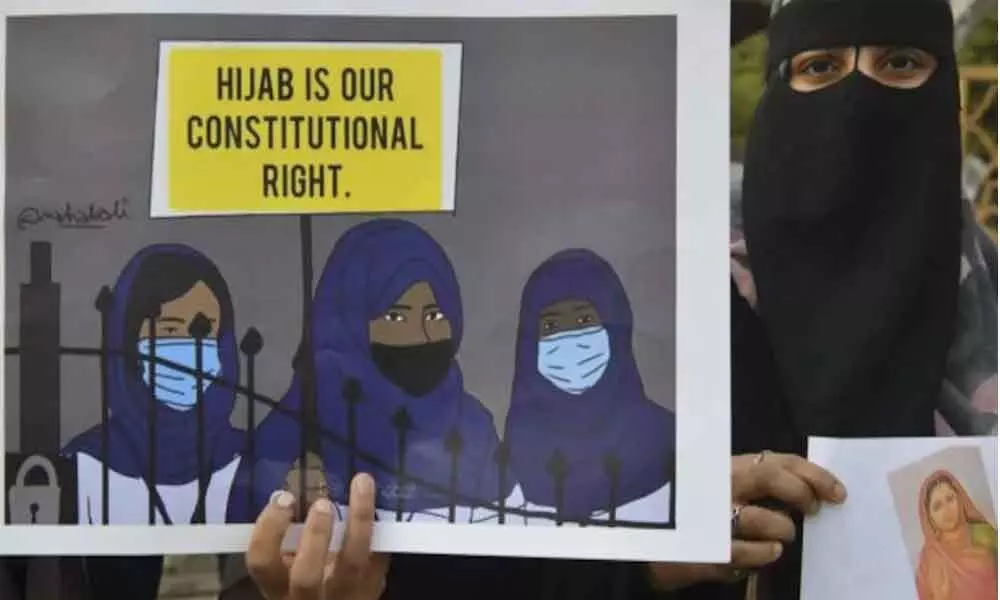A deliberate campaign to shift goalposts

Representational Image
The problem with the so-called “hijab controversy” is that the “controversy” has come about because of what seems to be a concerted and deliberate campaign to shift the goalposts, paradigms and terms of reference.
The problem with the so-called "hijab controversy" is that the "controversy" has come about because of what seems to be a concerted and deliberate campaign to shift the goalposts, paradigms and terms of reference. I say deliberate, because almost everyone involved seems to know what the core of the issue is, but in order to keep the issue burning for reasons ranging from electoral gains to newspaper sales, have decided to muddy the waters.
Perhaps the main reason for at least some of the criticism is the "essential religious practices" (ERP) test laid down by the Supreme Court which abrogates to it the right to determine the individual interpretations of religion. At the very least there is a case to be made here that the ERP in itself is deeply violative of the ERP of Hindus and Sunnis. For Hindus who have the freedom to cherry-pick what they choose to hold near and dear from a buffet of ideas, beliefs and practices, the very notion of an ERP subjugates Hinduism's much cherished and celebrated individualism to group interpretation. What is worse is that largely being an oral tradition imbibed through osmosis, it has always given short shrift to Hinduism as the jurisprudence prioritises written canonical texts.
With Sunni Islam ERP is violative in a different way. A core tenet of Sunni belief is ijtihad or the right of every Muslim to read and interpret the Quran for himself or herself. Essentially therefore, ERP is tantamount to snatching away a core religious right for any Sunni. There is no getting away with it — ERP from any angle you look at it violates every principle of Fundamental Rights ensured in the Constitution. Given this you'd assume that the hijab judgement is ab initio flawed? Well the stated ERP rationale is deeply flawed, but the upholding of the ban on the hijab in public schools is not.
While ERP has been one of the main logical 'flummoxers', a particularly mischievous editorial in The Indian Express pretty much summed up all the contortions and logical fallacies that have been applied by those opposing the judgement. The first is the notion that the "headscarf" has been banned. This is utter rubbish: What has been upheld is the right of a "qualified public space" — that is to say a public space where certain regulations apply as a criteria of entry — to enforce any rule it sees fit. What is this concept of a qualified public space? Well in terms of a school, the promise of services — an equal and fair education — is subject to the conditionality of discipline, namely a uniform. What a uniform does is it provides children with a sense of equality, minimising differences be they social, caste, class, religious etc.
Obviously basic requirements are always accommodated — Sikhs are allowed to wear a turban, and Muslim girls a headscarf. What is not allowed is for Sikhs to wear a Kripan and for Muslim ladies to wear a full burqa or for Digamber Jain children to appear stark naked. The issue here is that all the children in question (assume they have agency) entered the school knowing the terms and conditions in advance, including allowing just a headscarf, but not a full burqa, and then post facto after accepting the terms and conditions of entry attempted to re-negotiate the terms of said contract, by altering the variations to uniform allowed to a point where the uniform simply ceased to exist. Mind you, they did not do this at private Muslim schools that do allow for such clothes, but rather wanted to impose it on a government school that does not. The imposition was that of the students and their puppet masters, not that of the government or court.
Second, it claimed that the judgement failed to address "discrimination in public spaces", right of choice and proportionality of restrictions. This is bunkum, but expected from a paper once run by an RSS man but today a madhouse of distortion and wokery, that publishes calls to riot and engage in violence against the Indian state, peddles known Kashmiri separatist positions, and has as its star columnist a known data manipulator and forger who has been thoroughly exposed these last few weeks. The qualified public space principle addresses all these questions quite specifically. So then follows the sleight of hand in claiming that schools are not "qualified public places" as opposed to prisons, courts, war rooms, and defence camps. Anyone who has actually been to school, and I'm assuming The Indian Express' editorial board has (though you wouldn't guess it) would know that schools are the most restrictive and disciplinarian public spaces in existence — for good reason. The students there are minors, who do not have free choice till they attain majority and are subjected to restrictions far tougher than what the paper would have you believe a qualified public space is.
In short, rights have neither been taken away, nor narrowed. Far from it, a well-funded and carefully manipulated attempt at inciting communal tension, and increasing outrage TV viewership and newspaper sales has been thwarted. No wonder the press and agent provocateurs are so upset. Our secularism on the other hand stays strong.
(Courtesy: Firstpost)
The writer is a senior fellow at the Institute of Peace and Conflict Studies. The views expressed in this article are those of the author and do not represent the stand of this publication.














